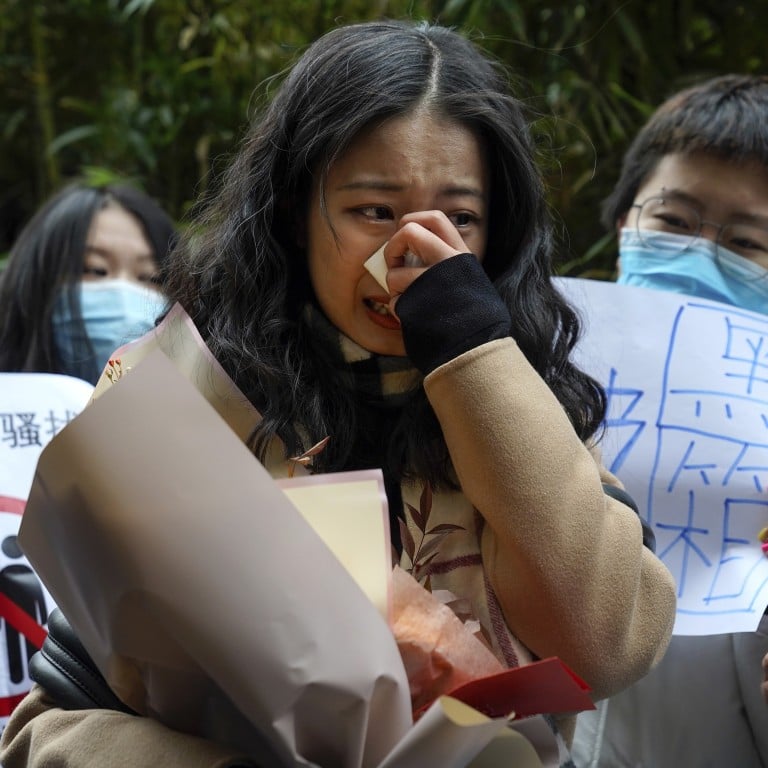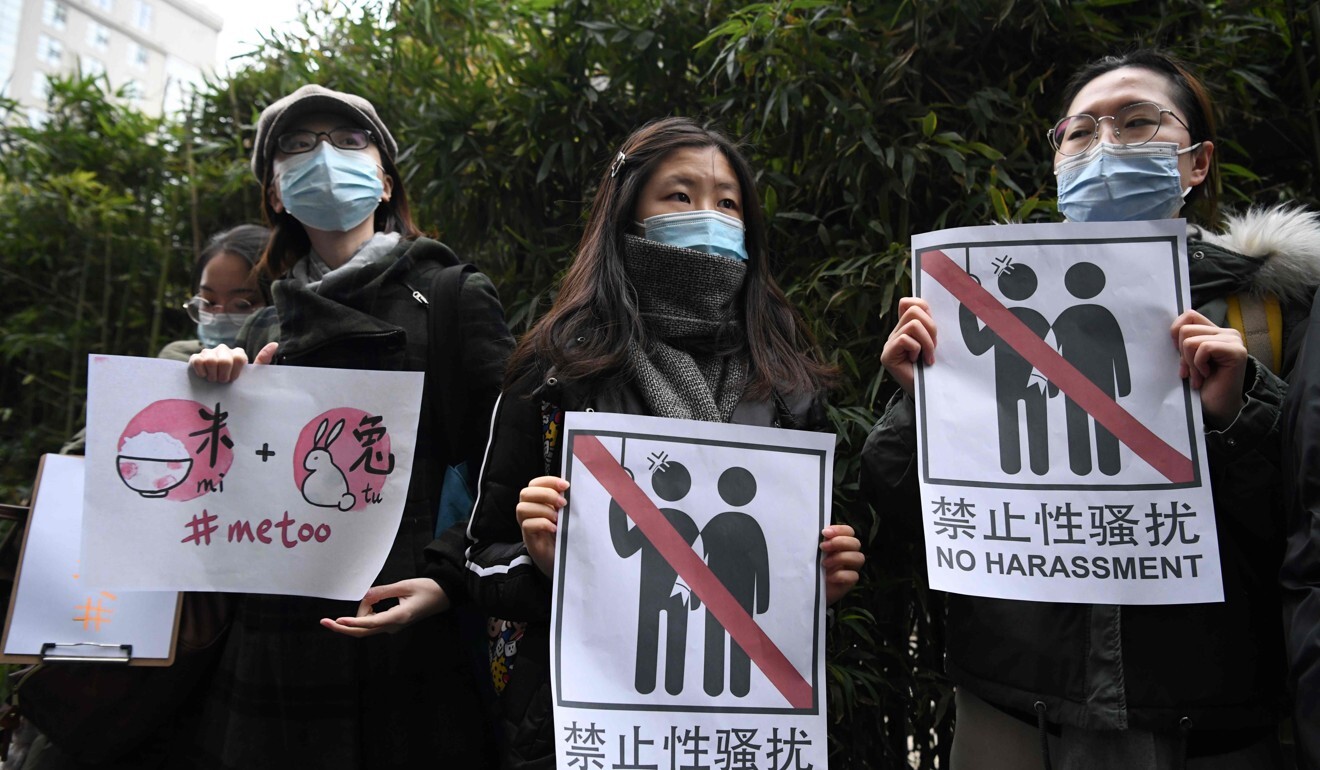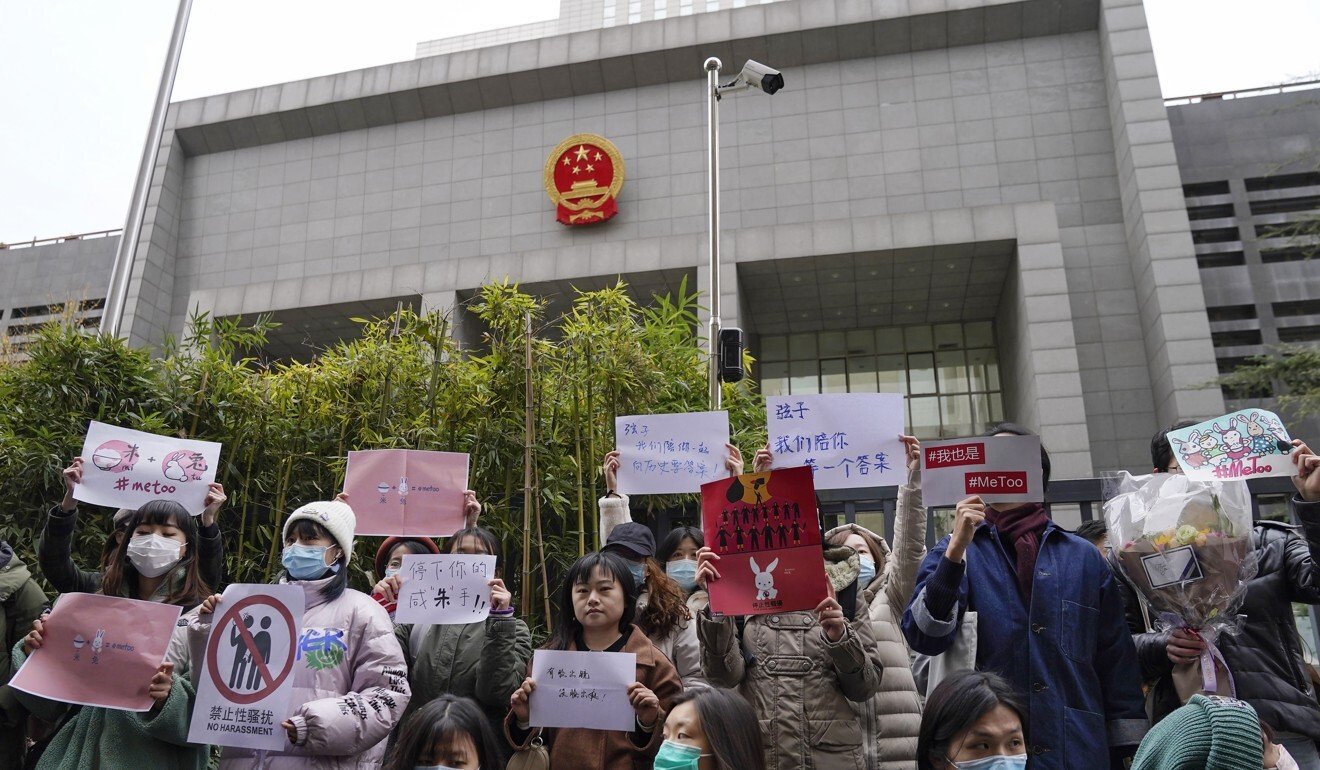
Chinese #MeToo pioneer Zhou Xiaoxuan gets her day in court as she sues TV host Zhu Jun for allegedly sexually harrassing her
- Hundreds of supporters gathered outside a court in Beijing on Wednesday to support Zhou Xiaoxuan in a landmark hearing
- Zhou is seeking damages and an apology from CCTV presenter Zhu Jun over claims he forcibly kissed her
A sexual harassment case that has been hailed as a pioneering moment for China’s #MeToo movement in China opened in Beijing on Wednesday attracting hundreds of supporters for the plaintiff.
Zhou Xiaoxuan, 27, is suing Zhu Jun, a prominent television host whom she accuses of forcibly kissing her in 2014. She is demanding a public apology from Zhu and 50,000 yuan (US$7,600) in damages.
Zhou’s case is being closely watched as it followed the passage of China’s first Civil Code in May, which provided an expanded definition of sexual harassment and greater protection for victims.
Better known by her nickname Xianzi, Zhou alleged that Zhu harassed her when she worked as an intern for state broadcaster CCTV six years ago.

She first posted her allegations online in 2018. Zhu, who denies the claims, unsuccessfully filed a counter lawsuit accusing her of damaging his reputation.
Speaking to supporters outside the Haidian district people’s court in Beijing, Zhou called on them not to lose heart and said they should “keep up the fight” in defending the rights of sexual harassment victims.
“Even if we don’t win legally at the end, as long as people know that there are sexual harassment victims like me, then we should see that as a victory of sort,” she said.
China clears lawyer in #MeToo storm of child rape claims
She was greeted by loud cheers from the supporters who held up placards saying “support Xianzi”, “sure victory” and “Jiayou”, or “add oil”, meaning “go for it”.
“It’s such a moving moment, nobody organised this, we are all here voluntarily for Xianzi,” said an activist known as Xiaomi.
“Xianzi’s fight for justice and equality has influenced many young people. There are not just people who pay attention to gender-based violence but also people from the LGBT community,” Xiaomi, the director of Beijing-based NGO China SOGIE Youth Network, said.
But the gathering also drew the attention of the police, who repeatedly warned them to go away and not to gather.
Amelie Chen, a 26-year-old supporter from Beijing, said they were well aware of the police presence.
China court upholds landmark #MeToo sexual harassment verdict
“I think all supporters know the risks of gathering here, so almost everyone wore masks. Partly because of the [Covid-19] epidemic, partly to protect ourselves. Either way, it is worth being here to support Xianzi.”
Xiaohai, a young woman supporter from Guangzhou, said she saw a young videographer who was taping the gathering being driven away by three unidentified men. “I shouted ‘Shame on you!’ at the three men,” she said adding that she was prepared to be arrested.
China’s #MeToo movement is still in its infancy as authorities have taken a hardline stance against any social movements which they deem threatening to social stability and control.

In 2015, five women’s rights activists who planned to hold a public campaign against sexual harassment on buses in the run-up to Women’s Day were arrested and detained for over a month on charges of “picking quarrels and provoking trouble” by Beijing police.
Sophia Huang Xueqin, a leading figure in the movement, conducted a survey held workplace harassment in the news industry in 2017. She was detained for three months in October 2019 after she published articles offering her observations about the public protests in Hong Kong.
“Seeing Xianzi and the victory placards today … I have a strong feeling across time and space that this is history in the making for women, and we are witnessing the awakening of our power through actions,” Huang said.
But she was worried about the future.
“The more powerful the movement gets, the more likely the authorities would watch it closely and suppress it,” she said.
Hearings in Zhou’s case are continuing and it is not known when the verdict will be delivered.


.jpg?itok=H5_PTCSf&v=1700020945)